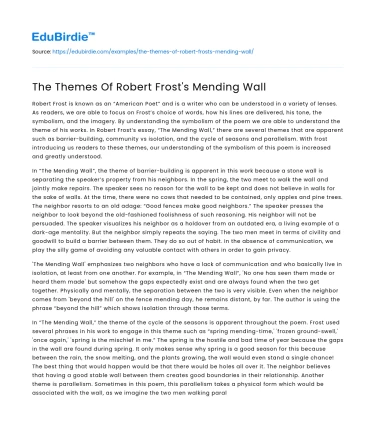Robert Frost is known as an “American Poet” and is a writer who can be understood in a variety of lenses. As readers, we are able to focus on Frost’s choice of words, how his lines are delivered, his tone, the symbolism, and the imagery. By understanding the symbolism of the poem we are able to understand the theme of his works. In Robert Frost’s essay, “The Mending Wall,” there are several themes that are apparent such as barrier-building, community vs isolation, and the cycle of seasons and parallelism. With frost introducing us readers to these themes, our understanding of the symbolism of this poem is increased and greatly understood.
In “The Mending Wall”, the theme of barrier-building is apparent in this work because a stone wall is separating the speaker’s property from his neighbors. In the spring, the two meet to walk the wall and jointly make repairs. The speaker sees no reason for the wall to be kept and does not believe in walls for the sake of walls. At the time, there were no cows that needed to be contained, only apples and pine trees. The neighbor resorts to an old adage: “Good fences make good neighbors.” The speaker presses the neighbor to look beyond the old-fashioned foolishness of such reasoning. His neighbor will not be persuaded. The speaker visualizes his neighbor as a holdover from an outdated era, a living example of a dark-age mentality. But the neighbor simply repeats the saying. The two men meet in terms of civility and goodwill to build a barrier between them. They do so out of habit. In the absence of communication, we play the silly game of avoiding any valuable contact with others in order to gain privacy.
Save your time!
We can take care of your essay
- Proper editing and formatting
- Free revision, title page, and bibliography
- Flexible prices and money-back guarantee
'The Mending Wall' emphasizes two neighbors who have a lack of communication and who basically live in isolation, at least from one another. For example, in “The Mending Wall”, 'No one has seen them made or heard them made' but somehow the gaps expectedly exist and are always found when the two get together. Physically and mentally, the separation between the two is very visible. Even when the neighbor comes from 'beyond the hill' on the fence mending day, he remains distant, by far. The author is using the phrase “beyond the hill” which shows isolation through those terms.
In “The Mending Wall,” the theme of the cycle of the seasons is apparent throughout the poem. Frost used several phrases in his work to engage in this theme such as “spring mending-time,' 'frozen ground-swell,' 'once again,' 'spring is the mischief in me.” The spring is the hostile and bad time of year because the gaps in the wall are found during spring. It only makes sense why spring is a good season for this because between the rain, the snow melting, and the plants growing, the wall would even stand a single chance! The best thing that would happen would be that there would be holes all over it. The neighbor believes that having a good stable wall between them creates good boundaries in their relationship. Another theme is parallelism. Sometimes in this poem, this parallelism takes a physical form which would be associated with the wall, as we imagine the two men walking parallel paths. For example, 'We meet to walk the line. 'We keep the wall between us as we go.' 'One on a side.' It is not only a physical one but also a mental one as well.
In conclusion, A stone wall is separating the speaker’s property from his neighbor’s. In spring, and only spring, the two meet to walk the wall and together they make repairs. The speaker sees no reason for the wall to be kept because there are no cows to be contained, just apple and pine trees. He does not believe in walls for the sake of walls. The neighbor resorts to an old saying: “Good fences make good neighbors.” The speaker remains unconvinced and mischievously presses the neighbor to look beyond the old-fashioned foolishness of such reasoning. His neighbor will not be swayed. The neighbor simply repeats the adage. The speaker would have us believe that there are two types of people: those who stubbornly insist on building superfluous walls and those who would dispense with this practice. There are several themes shown in this poem, such as barrier-building, community vs isolation and the cycle of seasons and parallelism all which help us to understand the symbolic reasoning behind this poem and why Frost wrote it.
Work Cited
- Frost, Robert. “Mending Wall.” Poetry For Students, edited by Mary Ruby, vol.5, Gale, 1999. Literary Sources. Accessed 4 April 2020.






 Stuck on your essay?
Stuck on your essay?

